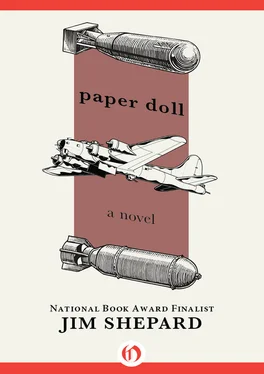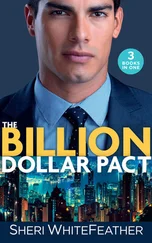At a pleasing wide bend in the river they stopped, and rattled their bikes down a short embankment to the water’s edge. Jean led them further along a path until a crescent of lawn shielded from the road appeared, and there with a sigh she dropped onto the grass two small satchels that had jounced patiently on the bicycle baskets during the ride. They peeled off tops and shorts and settled down to the water and the sun. The undressing seemed illicit and exciting and awkward, though it was all on the up and up.
“This is something,” Bryant enthused. “This is okay.” He gave Robin’s arm a squeeze. He could feel the sun drawing the smell from the damp earth.
“I love hearing men talk. That’s what I miss most,” Jean said. Her eyes were closed and her cheeks were pink in the sun.
Robin murmured something reassuring. Her bare arm indolently extended in his direction. Her eyes were closed and relaxed despite facing the sun and her mouth was slightly open. He guessed she didn’t feel like conversation. From somewhere he caught the faint and pleasant smell of an oxidized apple. Above them the sun shining through some birch leaves gave them the translucence of fresh grapes.
He thought, I could retire to a place like this, and then grimaced. Retire from what? He saw himself a fat hatless old man in shorts, still unable to track a German fighter with a Sperry turret. But it seemed foolish and wasteful worrying while on leave with Robin, and he settled to face the sun. It bloomed a luminous red beneath his closed eyelids.
Now I’m thinking about Lois, he realized morosely.
“It’s very good to see you, Bobby Bryant,” Robin said. She was slowly smoothing her hair back from her ears.
“You look great,” he said. “I’ve been trying to figure out some way of saying it that doesn’t sound sappy.”
She had a winning way of snorting in amusement at herself. “I’m vain, really,” she said. “Comes from my grandmother Janie, I’m told. I’ll tell you about her sometime.”
Bryant didn’t answer. He had the awful feeling at times like this, when he was at a loss for a response, that Robin was inexorably coming to realize that he wasn’t good enough for her.
She got up onto one knee, lifting her hair from the back of her neck, and straightened her arms languidly. “I think I’ll have a paddle,” she said.
At the edge she hunched low and swept water up over her arms and chest, giving a little shake as she did so. He closed his eyes again, and heard the splash of Robin diving in and opened his eyes and immediately she surfaced making crouping sounds. “It’s like ice,” she was finally able to say.
Her mother had dinner ready when they returned. There was a small pewter pot of horseradish on the table as well, which did not seem to be a mistake, though none of the women used it. Snowberry spooned a small portion onto the outside of his plate. While they ate, Elizabeth recounted in some detail her first sighting of Americans.
“One of them gave Mother a flower,” Robin said. “She’s been a supporter of the Yanks ever since. I think he in point of fact gave her one of her own bluebells.”
“Nonscriptus,” Bryant said, remembering Robin’s water-color, and her mother smiled, pleased that this American had a finer side.
The women talked about where rationed commodities were becoming available. They talked about the war in the village. “We had a Wellington crash nearby some months ago, as well,” Robin said. “Near the cottage of an elderly friend. We went straight off to look in on her and we found her drinking port in the front room, with a kettle lid on her head, tied with a regimental tie.”
Bryant laughed in a way he hoped maintained decorum. Snowberry grinned.
“She was ready for another blitz, I suppose,” Elizabeth said.
After a custard made from white powder from a lidded tin, Snowberry held out for nightlife, so they walked the half mile or so through the cool twilight to the local pub. At the door Snowberry pointed up to the overhanging sign, “Ye Silent Woman Pub.” Underneath was carved a decapitated woman. “Very sweet,” Robin said.
They sat around a table and listened for a short while to the patrons. Snowberry cleared his throat and smiled and sat up straighter in the chair. “So what did you girls think of a couple of enlisted men asking you out?” he said.
“I put it down to the immaturity and egotism of youth,” Jean said.
“You know the British attitude towards the Yanks,” Robin said. “Eager blunderers who succeed through sheer weight of numbers.”
Bryant could see Snowberry fingering something in his pants pocket and hoped it wasn’t the condoms. Snowberry said, “So why date us when the RAF is full of Leslie Howards?”
“Well, you’re still to some small degree British,” Robin conceded. “Unruly colonials come over to help. There is that.”
“And of course, you have chocolate,” Jean said. She had large round eyes which frequently lent her expressions a misleading suggestion of credulousness.
“Unruly is right,” Snowberry said with enthusiasm. “The other night you should have seen us. We were at The Hoops and from there we flattened this chemist’s shop. Looked like someone had backed a truck right through it.”
“How does one ruin an entire chemist’s shop?” Robin asked. She did not sound pleased.
“We started early,” Snowberry said. He slugged his beer.
Robin sighed. Jean sipped the beer. At the bar they were arguing about the quality of the whiskey.
“I guess we’re sort of like what you hear about Americans, huh?” Bryant said.
Robin conceded a small smile. “What do the Americans say about us?” she asked. “We’re curious.”
“There’re two theories,” Snowberry said. “One is that English girls are as loose as a goose, and that they’ll say right out what candy or gum’ll get you. The other is that they’re just like any other girls, and that any guy who thinks differently is a sap. Lewis is always saying that.”
“And to which view do you subscribe?” Robin asked.
“I think you’re the berries,” Snowberry said.
“A third theory,” Jean said disparagingly.
Bryant knew the statement to be only half fraudulent: Snowberry was wild about Jean, probably more than he knew, and had been able to keep his feelings fairly discreet, a trick Bryant envied. But he also had quoted theory number one to Bryant more than once, and liked to say concerning Jean’s response to alcohol that after a few drinks the three inhibitions she did have disappeared. The commonly accepted wisdom around the squadron based on both experience and wishful thinking was that if you wore wings, you were halfway home.
“You shouldn’t flatter yourself, Gordon,” Jean said. “We’re here because you’re entertaining, and every bit as generous as you’re hopeful.” Robin laughed. “And”—Jean touched his cheek—“you’re quite handsome, in a younger brother way.”
Snowberry grinned. “Now we’re getting somewhere.”
“If you ladies are golddiggers, why not officers?” Bryant asked. “Why not Lieutenant Gabriel, or Cooper?” He was secretly afraid of just that: officers with more going for them stealing her away.
“Don’t give them a choice like that,” Snowberry said. “Make it fair. Isn’t Gable an officer?”
“I think you’ve proven quite nicely that enlisted men, with a bit of jerrying around here and there, somehow acquire all the resources available in your Air Corps to officers.”
“I think we ought to put our cards on the table,” Bryant said. “We think you’re the berries, and you think we’re tops, too.”
Robin smiled. She raised her glass, and they toasted the announcement. One by one they fell to gazing at a poster over the door, of a British Tommy charging forward with a disconcerting ferocity. The caption read, He’s Working for You — Are You Working for Him? The poster had evidently been torn in half and reassembled. Robin mentioned the connection with the pub’s sign. They drank more quickly, looking for the most part at each other, anxious to get out from under the influence of the poster.
Читать дальше












